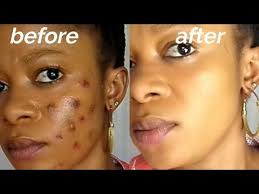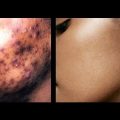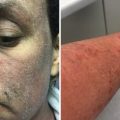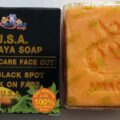Dark spots on the skin also known as hyperpigmentation, age spots, solar lentigines, or liver spots, depending on their cause can happen at any time, but most often appear in middle age. It is a common, usually harmless condition that can affect the skin color of people of any race. Age or “liver” spots are a common form of hyperpigmentation. They occur due to sun damage, and are referred to by doctors as solar lentigines. These small, darkened patches are usually found on the hands and face or other areas frequently exposed to the sun. Melasma or chloasma spots are similar in appearance to age spots but are larger areas of darkened skin that appear most often as a result of hormonal changes. Pregnancy, for example, can trigger overproduction of melanin that causes the “mask of pregnancy” on the face and darkened skin on the abdomen and other areas.
Causes and Risk Factors for dark spots
Dark spots are the result of the overproduction or collection of melanin (skin pigment) and/or free radical damage.
Exposure to UV light: Whether from the sun or from an artificial source, such as tanning beds—is the most significant cause. Hyperpigmentation often starts to take hold during middle age when the skin starts to show the consequences of sun exposure, especially if sunscreen and other sun-protective measures were not used. Those with light hair or skin, and who have had severe and/or many sunburns are at particular risk. The following other causes, however, may be at play either alone or in conjunction with one another or UV exposure.
Medications: Certain medications can cause dark spots because they make the skin hypersensitive to sun exposure (photosensitive). They include:
Estrogens: such as Vagifem, Climara, and Estrace.
Tetracyclines: broad-spectrum antibiotics such as Adoxa (doxycycline), Declomycin (demeclocycline), and Minocin (minocycline)
Amiodarone: used to treat irregular heartbeat; brand names include Cordarone and Pacerone .
Phenytoin: an anticonvulsant; brand names include Dilantin and Phenytek.
Phenothiazines: used to treat mental and emotional disorders; brand names include Compro and Thorazine,
Sulfonamides: used to treat infections; brand names include Bactrim and Septra (sulfamethoxazole/trimethoprim)
Skin Conditions: There are several different skin conditions and diseases that can cause dark spots and areas, though these are not the same as age-related dark spots. They include:
Post-inflammatory hyperpigmentation: Skin discoloration following an inflammatory lesion, like acne
Melasma: Also known as pregnancy mask
Linea nigra: A dark, vertical line that appears lengthwise down the middle of the abdomen during pregnancy
Chloasma: Darkened skin due to hormonal changes
Riehl’s Melanosis: A form of contact dermatitis that’s believed to be caused by sun exposure
Poikiloderma of Civatte: A benign condition that turns parts of the neck a reddish-brown color
Erythromelanosis follicularis: A condition that’s characterized by reddish-brown pigmentation of the face and neck.
Other Causes
Liver disease
Pregnancy
Liver disease
Addison’s disease
Pituitary tumors13
Hemochromatosis (excessive iron)
How to Naturally Remove Dark Spots Caused by Pimples, Acne and Sun Spots
Do you have black spots or acne marks on your face? have you been looking for how to remove dark spots caused by pimples or sun spots? Search no more, because I am here to show you how to remove dark spots on face overnight.
Dark spots also known as age spots, hyperpigmentation, sun spots, freckles etc. They are marks, left on the face, skin, or any parts of the body, due to excessive exposure to acne, sunlight, blemishes, pimples and others. These spots on the skin are sometimes hard to remove even with some dark spot remover cream. However, I will show you an overnight home remedy to remove acne dark spots, fast.
How to remove dark spots on face overnight with apple cider vinegar
Apple cider vinegar is one of the best home remedies to remove dark spots on your face or skin. Apple cider vinegar can be used as a toner to treat a breakout. It can be used as a toner becasue of its anti-inflammatory properties. In addition, ACV can help balance your skin’s pH levels. By reducing pH levels of the skin it can help dry up acne spots and remove dead skin cells. This is due to the presence of skin beneficial antioxidants like vitamin A, B, C, and alpha hydroxy acids which helps to remove dark marks and dead skin cells from the body easily. It also assists in new skin regeneration thereby making your skin brighter.
How to apply apple cider vinegar on black marks on your face
Get a little water and add 2 – 4 drops of apple cider vinegar to it
Make sure it mixes uniformly with the water
Use a cotton ball and rub it the black acne or pimple marks
Allow it to stay overnight, and you will be amazed by the result you will see after a few applications.
Note: Always apply the remedy at night, to protect your skin from the reactions between apple cider vinegar and UV rays from the sun, unless you will use sunscreen guard.
Applying potato juice on the dark marks
Topical application of potato juice can help combat and treat a range of skin related issues such as skin darkening, scars, spots, blemishes, hard skin, et cetera. It contains vitamin B6, vitamin C, phosphorous, potassium, zinc, and other minerals which is responsible for its bleaching property. The potato paste whitens the skin colour and fades away black marks quickly. The juice also induces collagen production which helps in maintaining healthy and bright skin.
How you can get rid of dark spots overnight with potato paste
Get a fresh potato and grind it into tiny parts
Mix it with pure honey
Apply it on the black dots and live it overnight.
Wash it off the next morning with warm water.
It will fade away all those acne marks on your face, leaving you with even fair skin.
Use aloe vera for dark spots removal
Aloe vera contains aloin, a natural depigmenting compound that has been shown to lighten skin and work effectively as a nontoxic hyperpigmentation treatment, according to a 2012 study. Aloe Vera doesn’t make the skin darker, but rather help with hyperpigmentation and provide a clear complexion. Plus it’s amazing to use on sunburn. The plant contains aloin, beta-carotene and other skin beneficial amino acids which helps in removing black patches on your face or skin without any harmful effects. It helps with your pigmentation and also fade away your acne marks. It’s full of skin loving minerals and it’s really a Skin-food for your skin.
How to remove dark patches on the skin with aloe vera gel
Get a fresh aloe vera leaf
Extract the gel from the leaf
Apply it on the black spots and leave it overnight to fade away the dark blemishes.
Apply lemon juice on the black scars
Lemons are rich in vitamin C and citric acid, so they can help brighten and lighten your skin when used over time. “Vitamin C is a great antioxidant for neutralizing free radicals and boosting collagen production,” says Marina Peredo, MD, a dermatologist. Lemon juice which is known for its bleaching properties contains vitamin C and citric acid which helps it to fade dark spots easily. It also improves the skin tone, keeping your face bright and spot free.
How to use lemon juice to remove age spots on face
Get a lemon fruit and extract the juice into a container
Dilute it with little water to reduce its sensitivity
Use a cotton ball to dab it on the skin spot.
Repeat the process for at least 3 times a week to whiten your skin colour.
How to remove dark spots caused by pimples with yoghurt cream
Naturally reduce fine lines and wrinkles from forming with an anti-aging yogurt face mask. The lactic acid in yogurt will help dissolve dead skin and tighten pores. Yogurt is very good for skin. But leaving it overnight is not a good idea because it can make your skin oily and sticky. It is best to apply yogurt on face and wash it off after 15 minutes.
How to use yoghurt cream and lime juice to lighten acne dark marks
Get 2- 3 tablespoons of yoghurt cream
Add one teaspoon of lemon juice
Turn it to mix evenly
Apply it to form a yoghurt face mask on your face
Allow the black spot remover cream overnight before washing it away
Repeat it 2 – 3 times a week for optimum result.
Use tomato juice for face spot remover
Tomato juice is one of the natural remedies for dark spot removal. It contains lycopene, vitamin A, B, C and other antioxidants which protect the skin from free radical actions, hence improving healthy skin.
How to use tomato paste and lemon juice fade acne marks
Get 2 tablespoons of fresh tomato juice
1 tablespoon of lemon juice
Mix them together
Apply the juice on the black pimple or spot using a cotton ball and allow it to dry.
Wash your face with clean water after it might have dried
Repeat the treatment until the spots on face fade away
See: Moisturizer Withdrawal: Everything You Should Know
Baking soda and lemon juice for black spots removal
Baking soda may help reduce acne breakouts and manage pain and inflammation of the skin due to its anti-inflammatory and antiseptic properties. The mixture of baking soda and lemon juice brightens your skin tone and also clears all forms of dark spots caused by either pimples or acne. However, using baking soda on the skin is not widely recommended by healthcare professionals, as it can irritate the skin and remove important protective oils.
How to make a baking soda and lemon juice paste for skin spot removal
Get baking soda
Add some lime juice to it and stir to mix evenly
Apply the paste on the scars and leave it overnight
Wash it off tomorrow morning
Repeat the treatment 2- 3 times and see how the black marks will fade away naturally.
Other Natural Remedies For Face Spot Removal
You can find over-the-counter products that claim skin lightening and “correcting” abilities via natural ingredients. According to Dr. Bank, common compounds in these products include:
Vitamin C sources: The antioxidant properties of vitamin C (ascorbic acid) and its role in collagen synthesis make vitamin C a vital molecule for skin health. Dietary and topical ascorbic acid have beneficial effects on skin cells, and some studies have shown that vitamin C may help prevent and treat ultraviolet (UV)-induced photodamage. Sources include orange, tomatoes, broccoli, brussels sprouts, and cauliflower, green and red peppers.spinach, cabbage, turnip greens, and other leafy greens.
Azelaic acid sources: Azelaic Acid is a naturally occurring dicarboxylic acid produced by Malassezia furfur and found in whole grain cereals, rye, barley and animal products. Azelaic acid possesses antibacterial, keratolytic, comedolytic, and anti-oxidant activity.
pomegranate extract: The antioxidants found in pomegranate extract combined with phytonutrients, minerals, fatty acids and vitamins work in synergy to plump the skin and promote collagen production. Pomegranate juice contains higher levels of antioxidants than most other fruit juices. The antioxidants in pomegranate juice can help remove free radicals, protect cells from damage, and reduce inflammation.
Beta carotene source: The human body converts beta carotene into vitamin A (retinol) – beta carotene is a precursor of vitamin A. We need vitamin A for healthy skin and mucus membranes, our immune system, and good eye health and vision. Carrots are an excellent source of beta carotene.
Licorice extract sources: The extract also has powerful antioxidants that help protect the skin from environmental stressors, as well as “licochalcone,” which helps balance oil, making this a good ingredient for those with oily skin. Licorice extract may also help diminish the appearance of dark under-eye circles, discoloration and age spots. See: Health Friendly Online Makeup Stores In Nigeria





